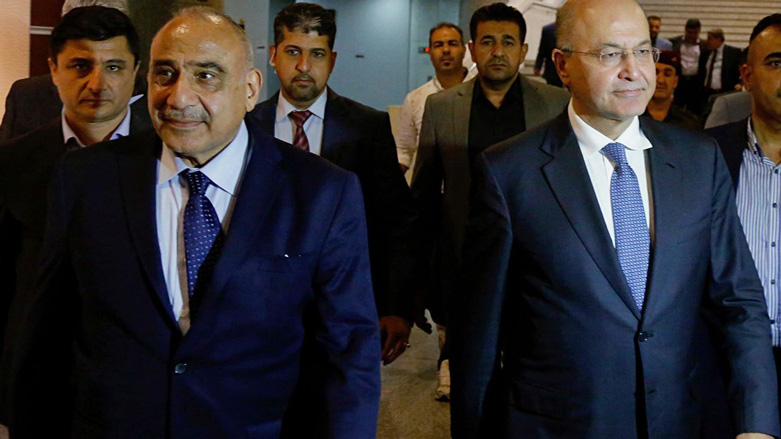Iraq gov’t in weak position amid growing US-Iran tensions: Think tank

ERBIL (Kurdistan 24) – A global think tank on Thursday warned that the current Iraqi government hangs on a slim parliamentary majority and will not be able to stop Iranian-backed paramilitary groups from striking US targets in the event of a confrontation.
According to a new International Crisis Group (ICG) report entitled “Iraq, Evading the Gathering Storm,” the new government formed under Prime Minister Adil Abdul Mahdi after the May 2018 national elections is particularly vulnerable to Iranian pressure.
Even though Abdul Mahdi and President Barham Salih are widely respected, it continued, they are isolated and lack significant parliamentary support.
“Today, with most senior officials sitting outside the largest parliamentary blocs, the government remains vulnerable to a no-confidence vote among the deputies,” the Brussels-based conflict prevention organization said.
Also, Iraq’s Finance Minister Fuad Hussein has made it clear that Baghdad cannot afford to stop doing business with Iran despite US pressure to do so. “Cutting gas imports from Iran will harm the government’s stability. The problem is political more than technical,” Hussein told ICG.
“We could import gas and electricity from other countries in the medium term, but if Iraq undermines its relationship with Iran, parliament is likely to withdraw its confidence in the government.”
The situation is worsened by rockets that fell close to US bases in Iraq in mid-June and attacks most likely carried out by Israel against Iraqi paramilitary groups with ties to Iran in July and August.
ICG underlined that Iraq’s “institutions and security forces remain brittle; and its government, elected a little over a year ago, hangs on to a slim, precarious parliamentary majority.”
The Abdul Mahdi administration would be unable to stop Tehran-backed Hashd al-Shaabi militias, also known as the Popular Mobilization Forces (PMF) from striking back as it saw fit if tensions escalate, the think tank argued, saying, “The prime minister’s control over the Hashd remains weak. Despite his efforts to reaffirm his command, several groups continue to operate in parallel to those factions integrated in the security forces.”
A PMF commander told ICG, “Iran does not want a war, but if there is going to be one, it will resort to all its allies in Iraq: not just fighters under the [PMF] but also those operating outside of it.”
A member of Iraq’s prominent Islamic Dawa Party with close ties to former Prime Minister Nouri al-Maliki said that Maliki’s faction of the party would choose Iran’s side in the case that war breaks out.
“The Hashd will operate outside the government’s purview. We may have an open-door policy with Saudi Arabia at the moment, but if there is going to be war, there won’t be a safe corner in the Gulf,” he said.
An Iraqi analyst close to the PMF was quoted as saying that, if fighting were to start, every “Hashd group has fighters outside its regular contingent, waiting for orders.”
In a potential conflict, Sunni PMF militias in Anbar province, where the largest US military base in Iraq is located, could mobilize, according to one of Anbar’s militiamen. This, he said, would endanger American troops.
In late May, Iraq’s National Security Adviser Falih al-Fayyadh issued an order that barred Sunni PMF leaders in Anbar from cooperating with US forces or receiving training and weapons from them.
When Chairman of the Joint Chiefs of Staff General Joseph F. Dunford was asked at a press briefing on Wednesday about US concerns regarding the safety of service members stationed in Iraq, he replied, “We're not complacent about force protection. We look at it every day and we’re very attentive to the operational environment when we make adjustments in our force protection.”
In its report, ICG argued that Washington and Tehran should keep Baghdad out of their confrontation, saying, “The costs to both of renewed instability in Iraq would exceed any benefits to either.”
If tensions between the two continue to grow, said the think tank, “US personnel in Iraq could become more vulnerable to attack by pro-Iranian militias. And this in turn could result in a security vacuum that “could enable an ISIS comeback.”
Editing by John J. Catherine
